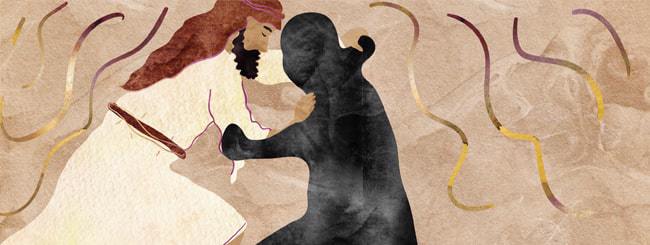 Rabbi David Etengoff ה' יעזור וירחם על אחינו, כל בני ישראל בארץ ישראל ובכל חלקי הארץ Sefer Bereishit presents three celebrated name changes that were declared by the Almighty or one of His angels. The first two were Avram and Sarai, whose names were changed to Avraham and Sarah: And Avram fell upon his face, and G-d spoke with him, saying…your name shall no longer be called Avram, but your name shall be Avraham, for I have made you the father of a multitude of nations. And Hashem said to Avraham, “Your wife Sarai − you shall not call her name Sarai, for Sarah is her name.” (17:3, 5, and 15, these and all Bible translations, The Judaica Press Complete Tanach) Midrash Bereishit Rabbah makes it very clear that Avraham’s name change is absolute and universal in nature, to the extent that it is forbidden to call him by his prior appellation: Bar Kapparah said: “Anyone who calls Avraham, ‘Avram’ [from this time forward] will violate a positive commandment (aseh).” Rabbi Lavi said: “He will not only disobey a positive directive, but he will also transgress a negative prohibition (lo ta’aseh), as well: ‘Your name shall no longer be called Avram,’ is the negative prohibition, and ‘Your name shall be Avraham,’ is the positive commandment.’” (Seder Vayishlach 78:3, this and the following translation and brackets my own) According to our midrash, however, Sarah’s name change is directed solely to Avraham, since the verse reads: “Your wife Sarai—you shall not call her name Sarai, for Sarah is her name.” In other words, Hashem gave Avraham a clear-cut personal directive to help him understand that his beloved wife was no longer his princess alone (“Sarai”), rather, she was now ready to take her place on the stage of world history as “Sarah.” As the verse states: “I will bless her, and she will become [a mother of] nations; kings of nations will be from her.” (17:16) Our parasha contains the third divinely decreed name change that narrate Ya’akov’s transition from Ya’akov to Yisrael: And he [Eisav’s angel] said, “Your name shall no longer be called Ya’akov, but Yisrael, because you have commanding power with [an angel of] G-d and with men, and you have prevailed. Hashem said to him, “Your name is Ya’akov. Your name shall no longer be called Ya’akov, but Yisrael shall be your name.” And He named him Yisrael. (32:29 and 35:10) On the surface, these pasukim seem quite similar. A considered reading reveals, however, that there are two different speakers; in 32:29, Eisav’s angel declares Ya’akov’s name change, whereas in 35:10, the speaker is the Almighty. In addition, 32:29 appears to depict a permanent name change, “Your name shall no longer be called Ya’akov, but Yisrael,” whereas in 35:10, Hashem somewhat curiously reminds Ya’akov, “Your name is Ya’akov,” prior to stating, “Your name shall no longer be called Ya’akov, but Yisrael shall be your name.” The confluence of these two verses led our midrash to ask whether Ya’akov’s name change to Yisrael was similar to his grandfather’s transformation from Avram to Avraham, or was it substantively different? Is it the case that one who calls Ya’akov “Ya’akov” will be in violation of a positive commandment [as in the case of Avraham/Avraham]? It has been taught: The name, “Ya’akov,” has not been uprooted, rather, the name Yisrael is now the essential appellation, whereas, the name, “Ya’akov,” is now of secondary import. [The opposite approach was offered by] Rabbi Zechariah in the name of Rabbi Acha — [Hashem told Ya’akov] that his primary name remained “Ya’akov,” but henceforth, “Yisrael will be your name.” In other words, “Ya’akov” was his main name, and “Yisrael” was his additional secondary name. Based on a close reading of the two opinions in the midrash, Ya’akov, unlike Avraham, retains his original name. The only question under debate is whether or not “Ya’akov” remains his essential name, or is it somehow eclipsed by the new name, “Yisrael?” In my view, the midrash is teaching us a profound lesson regarding Ya’akov’s very nature: henceforth he has a dual persona that is reflected by each of these names. As such, there are periods when he thrives as Ya’akov and lives as “an innocent man, dwelling in tents,” (25:27) and there are times when he must rise to existential challenges and be Yisrael, the one who has “commanding power with [an angel of] G-d and with men.” (32:29) The Ya’akov persona is illustrated by the prophet Michah when he speaks of him in this manner: “You (Hashem) shall give the truth of Ya’akov (emet l’Ya’akov), the loving-kindness of Avraham, which You swore to our forefathers from days of yore.” (Sefer Michah 7:20) In my estimation, Emet l’Ya’akov is only possible when Ya’akov is living a tranquil and introspective existence. Little wonder, then, that the first pasuk of Parashat Vayeshev states: “Ya’akov dwelt (vayeshev) in the land of his father’s sojourning, in the land of Canaan.” (37:1) In line with this analysis, Midrash Rabbah, Bereishit 84:3 interprets “vayeshev” as Ya’akov’s manifest desire to dwell serenely (b’shalveh) in the Land of Canaan, the land of his grandfather and father. May we be zocheh (merit) to see the fulfillment of emet l’Ya’akov, and the final words of the Kaddish realized in our time: “May He Who makes peace in His celestial heights make peace in His ultimate compassion for us and for all the Jewish people.” May this take place soon and, in our days, v’chane yihi ratzon. Shabbat Shalom Past drashot may be found at my blog-website: http://reparashathashavuah.org Please contact me at rdbe718@gmail.com to be added to my weekly email list. *** My audio shiurim on the topics of Tefilah and Tanach may be found at: http://tinyurl.com/8hsdpyd *** I have posted 164 of Rabbi Soloveitchik’s English language audio shiurim (MP3 format) spanning the years 1958-1984. Please click on the highlighted link: The Rav
0 Comments
 Rabbi David Etengoff ה' יעזור וירחם על אחינו, כל בני ישראל בארץ ישראל ובכל חלקי הארץ Our parasha begins with the famous words, “And Ya’akov left Beersheba, and he went to Haran.” (Sefer Bereishit 28:10, this and all Bible and Rashi translations, The Judaica Press Complete Tanach) His departure is a direct response to Rivka’s wishes, and Yitzchak’s earlier two-part statement: And Rivka said to Yitzchak, “I am disgusted with my life because of the daughters of Heth. If Ya’akov takes a wife of the daughters of Heth like these, from the daughters of the land, [Canaan] of what use is life to me?” (27:46, brackets my own) And Yitzchak called Ya’akov and blessed him, and he commanded him and said to him, “You shall not take a wife of the daughters of Canaan. Arise, go to Padan Aram, to the house of Betuel, your mother’s father, and take yourself from there a wife of the daughters of Lavan, your mother’s brother.” (28:1-2) Ya’akov fulfills his filial responsibility with alacrity and arrives “at the place and lodged there because the sun had set, and he took some of the stones of the place and placed [them] at his head, and he lay down in that place.” In a celebrated gloss in his Commentary on the Torah, Rashi (1040-105) identifies the place cited in this verse as Har Moriah, the location of both Akeidat Yitzhak and the future Beit HaMikdash. It is precisely in this location that the following miracle took place: And he dreamt and behold! a ladder set up on the ground (sulam mutzav artzah) and its top reached to heaven (v’rosho magiya od hashamaimah); and behold, angels of G-d were ascending and descending upon it. And behold, Hashem was standing over him, and He said, “I am Hashem, the G-d of Avraham your father, and the G-d of Yitzchak; the land upon which you are lying, to you I will give it and to your children.” (28:12-13, emendations my own) Our verse contains the sole instance in Tanach of the term “sulam.” Such an unusual word naturally captured the exegetical imaginations of Torah commentators throughout the ages. As such, we find the following Gematria-based interpretation of Ya’akov’s dream by Rabbi Shimon bar Yochai, the famed author of the Zohar: “And he dreamt:” Rabbi Shimon bar Yochai said: “[The Almighty] showed him [Ya’akov] Har Sinai. [What indication do we have in the verse that this is so?] The letter samech in Sinai equals 60, the first and last yud(s) [each] equal 10, and the nun is equivalent to 50. This adds up to 130—the exact same numerical value of the word “sulam.” In addition, in our verse, we find the expression, “mutzav artzah v’rosho magiya od hashamaimah,” [in regard to the sulam,] and in reference to Har Sinai we find, “…and the mountain burned with fire up to the midst of the heavens (hashamayim).” (Sefer Devarim 4:11, passage source, Midrash Tanchuma, Solomon Buber edition, Parashat Vayetze VII, translation and brackets my own) In sum, for Rabbi Shimon bar Yochai, the sulam is Ya’akov’s prophetic on-ramp to a vision of the future Revelation at Har Sinai. We are not surprised, therefore, when Ya’akov proclaims: “How awesome is this place! This is none other than the house of God, and this is the gate of heaven.” (28:17) Like Rabbi Shimon bar Yochai, the 14th century Torah scholar Rabbi Yaakov ben Asher was a master of using Gematria to elucidate the Torah’s meaning. In his Commentary on the Torah, he notes that the word “sulam” is the numerical equivalent of kol (130, voice), and joins this observation with a citation from the Zohar, I:266: “The voice of the righteous (tzaddikim) in prayer is the ladder upon which the angels ascend.” Shortly thereafter he states: “Everyone, therefore, who has true intention (kavanah) and heartfelt dedication in their prayers has a ladder with complete rungs upon which the angels will be able to ascend [to Heaven].” According to this interpretation of the Zohar, it appears that tzaddikim, by definition, have the ability to imbue their tefilah with deep level kavanah. Moreover, their prayers are so powerful and of such great import to HaKadosh Baruch Hu that they serve as a vehicle whereupon the angels can travel to heaven. We are neither prophets like Ya’akov, nor tzaddikim like those referenced in the Zohar. Nonetheless, we can invest our tefilot with heartfelt kavanah in order to feel that we are standing before the Holy One blessed be He. Then, with the help of the Almighty, we, too, will build ladders upon which “the angels will be able to ascend [to Heaven].” V’chane yihi ratzon. Shabbat Shalom Past drashot may be found at my blog-website: http://reparashathashavuah.org Please contact me at rdbe718@gmail.com to be added to my weekly email list. *** My audio shiurim on the topics of Tefilah and Tanach may be found at: http://tinyurl.com/8hsdpyd *** I have posted 164 of Rabbi Soloveitchik’s English language audio shiurim (MP3 format) spanning the years 1958-1984. Please click on the highlighted link: The Rav  Rabbi David Etengoff ה' יעזור וירחם על אחינו, כל בני ישראל בארץ ישראל ובכל חלקי הארץ Our parasha contains a pivotal narrative in the lives of the Avot, namely, a famine in Eretz Yisrael coupled with Yitzchak’s desire to travel to Egypt to avoid starvation. Unlike Avraham Avinu who faced the same scenario and traveled to Egypt, Hashem reveals himself to Yitzchak and commands him to remain in Eretz Yisrael: “And Hashem appeared to him, and said, ‘Do not go down to Egypt; dwell in the land that I will tell you.’” (Sefer Bereishit 26:2, this and all Bible and Rashi translations, The Judaica Press Complete Tanach) In addition to Hashem’s command to “dwell in the land that I will tell you,” He informs Yitzchak he will have numerous offspring, and the brit made with Avraham will be fulfilled through him: Sojourn in this land, and I [Hashem] will be with you, and I will bless you, for to you and to your children will I give all these lands, and I will establish the oath that I swore to Avraham, your father. And I will multiply your children like the stars of the heavens, and I will give your children all these lands, and all the nations of the earth will bless themselves by your children. (26:3-4, emendations my own) The Torah often refrains from providing a rationale for future events. In our case, however, Hashem explicitly tells Yitzchak the precise reason why he will receive these multiple brachot, “Because Avraham hearkened to My voice, and kept My charge (mishmarti), My commandments (mitzvotai), My statutes (chuchotai), and My instructions (torotai).” (26:5) Rashi explains these terms in the following manner: Mishmarti: [Referring to] decrees to distance [himself] from transgressing the warnings in the Torah, e.g. secondary prohibitions to prevent incest from occurring, and the Rabbinic decrees to safeguard the prohibitions of the Sabbath. Mitzvotai: [Referring to] things, which, had they not been written, would have been fit to be commanded, e.g. [prohibitions against] robbery and bloodshed. Chuchotai: [Referring to] things that the evil inclination and the nations of the world argue against, e.g. [the prohibitions against] eating pork and wearing garments of wool and linen for which no reason [is given], but [which are] the decree of the King and His statutes over His subjects. Torotai: To include the Oral Law, the laws given to Moses from Sinai. Rashi’s analysis is based upon a variety of Rabbinic sources that maintain that Avraham fulfilled the entire Torah, up to and including Rabbinic decrees and enactments—many generations before it was given at Mount Sinai. By way of illustration: Rab said: “Our father Avraham kept the entire Torah, as it is said: ‘Because Avraham hearkened to My voice [kept My charge, My commandments, My statutes, and My instructions].’” (Sefer Bereishit 26:5) …Raba or R. Ashi said: “Avraham, our father, kept even the law concerning the eruv tavshilin as it is said: ‘My Torahs:’ one being the Written Torah, the other the Oral Torah.” (Talmud Bavli, Yoma 28b, translation, The Soncino Talmud, with my emendations to enhance clarity) Why did Avraham fulfill the Torah if he was not commanded to do so? My rebbe and mentor, Rabbi Joseph B. Soloveitchik zatzal (1903-1993), known as “the Rav” by his students and followers, guides us toward an answer: In many respects, God was closer to Avraham than He was to Moses. An intangible feeling of tenderness lingers over the relationship of God to Avraham. There is the creative ardor, moving devotion and a lack of tension. All that God requests of Avraham is destined to promote the latter’s happiness and greatness. (The Emergence of Ethical Man, Michael S. Berger, page 155) The Rav further notes that Avraham acquired the moral law, and I believe, by extension, the Halacha, through “the mahazeh, the prophetic vision, not the royal decree [as in the case of Moses].” He continues this theme and suggests, “There is no imposition of divine authority… Only a bilateral covenant, which binds both man and God, was concluded.” According to the Rav, Avraham was Hashem’s friend; thus, once Avraham received his divine prophetic visions, he did everything in his power to comply with the Almighty’s every request: God addresses Himself to Avraham not in the commanding, authoritative tone of the L-rd but in the comradely, friendly manner of a fellow wanderer. He [God] wants a covenant with him. God, as it were, is lonesome and He is anxious to find a companion. Fellowship between God and man is the motto of Avraham’s life. (154-155, all brackets and underlining my own) Rav Soloveitchik’s statement that “God, as it were, is lonesome and He is anxious to find a companion” is a theological tour de force, teaching us that as much as we wish to encounter Hashem and draw close to Him, He, too, longs for the Jewish people’s embrace. In many ways, this concept is reminiscent of the first stanza of the stirring liturgical poem, “Yedid Nefesh,” that is often sung in Ashkenazi synagogues during Kabbalat Shabbat, and at Shalosh Seudot: Beloved of the soul (yedid nefesh), Compassionate Father, draw Your servant to Your Will, then Your servant will hurry like a hart to bow before Your majesty; to him Your friendship will be sweeter than the dripping of the honeycomb and any taste. (Translation, https://en.wikipedia.org/wiki/Yedid_Nefesh#Text) May we ever strive to emulate Avraham Avinu as we reach out to Hashem, our Yedid Nefesh, with heartfelt tefilot and dedication to His holy Torah. V’chane yihi ratzon. Shabbat Shalom Past drashot may be found at my blog-website: http://reparashathashavuah.org Please contact me at rdbe718@gmail.com to be added to my weekly email list. *** My audio shiurim on the topics of Tefilah and Tanach may be found at: http://tinyurl.com/8hsdpyd *** I have posted 164 of Rabbi Soloveitchik’s English language audio shiurim (MP3 format) spanning the years 1958-1984. Please click on the highlighted link: The Rav 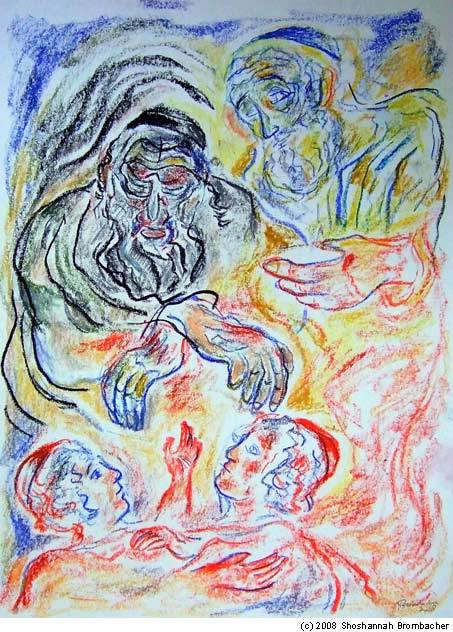 Rabbi David Etengoff ה' יעזור וירחם על אחינו, כל בני ישראל בארץ ישראל ובכל חלקי הארץ In the last chapter of our parasha, the Torah informs us that Avraham Avinu married Keturah following the death of his beloved wife Sarah: “And Avraham took another wife, and her name was Keturah.” (Sefer Bereishit 25, this and all Tanach and Rashi translations, The Judaica Press Complete Tanach) In his Commentary on the Torah on this pasuk, and basing himself on Midrash Bereishit Rabbah 61:4, Rashi (1040-1105) notes that Keturah was none other than Hagar. She received this unusual name, since her deeds were as “beautiful as ketoret (incense).” Keturah gave birth to six children, who, in turn, had a number of children of their own. Toward the end of his life, Avraham gave gifts to Keturah’s sons and “sent them away from his son Yitzchak while he [Avraham] was still alive, eastward to the land of the East.” (25:6) In the midst of this narrative, we are met with the following quizzical pasuk: “And Avraham gave (va’yitane) all that he possessed to Yitzchak.” (25:5) This is particularly difficult to understand, since during Eliezer’s presentation to Betuel and Lavan in our sedrah, the Torah had already informed us that Avraham had given Yitzchak his entire estate: “And Sarah, my master’s wife, bore a son to my master after she had become old, and he gave him (va’yitane) all that he possesses.” (24:36). As Rashi explains: “He [Eliezer] showed them [Betuel and Lavan] a gift deed (shtar matanah) [from Avraham to Yitzchak, of all his wealth].” If so, what is the Torah teaching us through this repetition in 25:5? (See Rabbeinu Eliyahu Mizrachi on our verse) In his supercommentary on Rashi’s Torah Commentary, entitled, Gur Aryeh, the Maharal (Rabbi Yehudah Loew ben Betzalel, 1526 approx.-1609) on Sefer Bereishit 25:5 provides insight regarding our question. He notes that in Sefer Bereishit 12:12, HaKadosh Baruch Hu promises Avraham Avinu, “v’heyai bracha—and [you shall] be a blessing.” Rashi on this pasuk opines: “The blessings are entrusted into your hand. Until now, they were in My [Hashem’s] hand; I blessed Adam and Noach. From now on, you may bless whomever you wish.” (See, Bereishit Rabbah, 39:11) The Maharal expands on this gloss and suggests, “[Avraham] gave this self-same gift (matanah) to Yitzchak, [that is,] to bless anyone he so desired.” This, then, is the rationale for the Torah’s inclusion of the verse: “And Avraham gave (va’yitane) all that he possessed to Yitzchak,” for now, Yitzchak, as well, was gifted with the power to bless others. Why is the ability to bless others considered a gift? At first glance, this seems to be supported by the wording of 25:5: “And Avraham gave (va’yitane) all that he possessed to Yitzchak,” since matanah is the nounal form of va’yitane, both of which derive from the infinitive, “latet—to give.” While this logic appears convincing, it is important to note that latet does not always connote the idea of a gift. We find, for example, in the first line of the Aleinu: “latet gedulah l’Yotzer Bereishit—to ascribe greatness to the Author of Creation.” Clearly, the acknowledgment of another’s status is not a gift. We are fortunate that the second Sochatchover rebbe, Rabbi Shmuel Bornsztain (1855-1926), shares his deep insights regarding the definitional structure of matanah in his classic work, Shem MiShmuel. In so doing, he explains why the power to bless someone is considered a gift: The expression, “matanah,” refers to something that has no connection whatsoever to the receiver, for if it was directly relevant to the receiver, it would already belong to him, and he would have no need accept it as a gift. This is the brand-new idea (chidush) that Avraham [brought to the world] when he gave the brachot to Yitzchak and utilized the word, “va’yitane.” This means that even though the brachot were not given to him [Yitzchak] m’tzad hadin (based on a legal right), they were nonetheless given to him b’torat matanah (through the conceptual category of a gift). (Parashat V’Zot HaBracha, 1912, translation and brackets my own) In sum, Avraham’s transfer of the power to bless others to Yitzchak was a true gift since it was not his m’tzad hadin. Yitzchak continued this practice when he blessed Ya’akov with a parallel phrase: “Va’yiten HaElokim (may G-d give) you of the dew of the heavens and [of] the fatness of the earth and an abundance of grain and wine.” (Sefer Bereishit 27:28) Ya’akov Avinu then carried this tradition forward in his blessings to each of his sons before his death. Echoes of this act are found, as well, in Moshe’s brachot to the Tribes of the Jewish people before their entry into Eretz Yisrael, and in the stirring words of our nation’ prophets. As Yeshayahu proclaimed so long ago: “And He shall judge between the nations and reprove many peoples, and they shall beat their swords into plowshares and their spears into pruning hooks; nation shall not lift the sword against nation, neither shall they learn war anymore.” (2:4) May the fulfillment of this nevuah come soon and in our days. V’chane yihi ratzon. Shabbat Shalom Past drashot may be found at my blog-website: http://reparashathashavuah.org Please contact me at rdbe718@gmail.com to be added to my weekly email list. *** My audio shiurim on the topics of Tefilah and Tanach may be found at: http://tinyurl.com/8hsdpyd *** I have posted 164 of Rabbi Soloveitchik’s English language audio shiurim (MP3 format) spanning the years 1958-1984. Please click on the highlighted link: The Rav  Rabbi David Etengoff ה' יעזור וירחם על אחינו, כל בני ישראל בארץ ישראל ובכל חלקי הארץ The stirring drama of Akeidat Yitzchak is one of the most celebrated passages in the Tanach. While much of this storied narrative is accessible, its final pasuk conceals more than it reveals: “And Avraham returned to his young men, and they arose and went together to Beer Sheva; and Avraham remained in Beer Sheva.” (Sefer Bereishit 22:19, this and all Tanach translations, The Judaica Press Complete Tanach). The Torah informs us that Avraham Avinu returned to his young men; we know nothing, however, of the whereabouts of Yitzchak Avinu, the survivor of the Akeidah. This leads Midrash Bereishit Rabbah 56:19 to ask, “v’Yitzchak heichan hu—and where was Yitzchak?” In their commentaries on the Torah, the Ibn Ezra (1089-1167), the Radak, (Rabbi David Kimchi, 1160-1235) and the Malbim (Rabbi Meir Leibush ben Yechiel Michel Wisser, 1809-1879) explain the absence of Yitzchak from our pasuk in a naturalistic manner. The Ibn Ezra suggests that there was no need to ask this question, since “he was within his own agency,” that is, he was his own person and free to travel wherever he so desired. The Radak opines: “It was not necessary [for the Torah to write] that Yitzchak was with him [Avraham]. [Rather,] it mentions Avraham as he was the ikkar—the essential one.” In sum, these approaches maintain that Yitzchak was certainly with Avraham, the protagonist of Akeidat Yitzchak, and as such, it was unnecessary to mention him in by name. In contrast, the Malbim focuses on a different side of the story, and portrays Yitzchak’s nonappearance in the text as driven by kibbud av v’ame: Sarah lived in Chevron at this time. And when Avraham returned from the Akeidah, he sent Yitzchak to Chevron to notify his mother that he was alive [after having] withstood his great test. Therefore, the text writes that Avraham, alone, returned, and they [Avraham, Yishmael and Eliezer, see Rashi] went to Beer Sheva—whereas Yitzchak went to Chevron. Therefore, [following Sarah’s passing,] there is no mention of Yitzchak coming to eulogize Sarah in Chevron as he already was there. (Translation my own) Midrash Bereishit Rabbah 56:19 follows these true-to-life approaches, as well, in its answer to its question, “v’Yitzchak heichan hu?” and suggests: “Rav Berechiah, in the name of the rabbis of the South, said that [Avraham] sent him [Yitzchak] to learn Torah from Shem.” This response raises two questions: “Why did Avraham send Yitzchak to study precisely at this time?” and, “If Avraham felt this was the moment for Yitzchak to double down on his Torah learning, why did he feel it was necessary to send him somewhere else to learn, rather than teach him himself?” In his Torah commentary, HaEmek Davar, the Netziv (Rabbi Naftali Tzvi Yehudah Berlin, 1816-1893), in his inimitable manner, simultaneously addresses both queries: It is possible to suggest that since Hashem proclaimed in the penultimate verse of the Akeidah: “eikev asher shamata b’koli—since you have hearkened to My voice,” [22:18] Avraham thought deeply about this statement and realized that it is the will of Hashem for one to be powerfully engaged in words of Torah. Moreover, even though Avraham had learned with him [Yitzchak], nonetheless, he realized that when it comes to depth-level mastery of the words of the Torah, it is better to base one’s learning on what one garners from two places [in this case, from Avraham and the yeshiva of Shem] … (Translation and brackets my own) The Netziv’s trenchant analysis is based on the well-known passage in Chazal: Rav said: Avraham Avinu fulfilled the entire Torah before it was given, as it is stated: “Because [eikev] Avraham hearkened to My voice and kept My charge, My mitzvot, My statutes and My Torahs” (Sefer Bereishit 26:5)… Rav said, and some say Rav Ashi said: Avraham Avinu fulfilled the entire Torah, even the mitzvah of eruv tavshilin, a rabbinic ordinance instituted later, as it is stated: “My Torahs.” Since the term is in the plural, it indicates that Avraham kept two Torahs; one, the Written Torah, and one, the Oral Torah. In the course of fulfilling the Oral Torah, he fulfilled all the details and parameters included therein. (Translation, Talmud Bavli, Yoma 28b, The Koren Talmud Bavli, Rabbi Adin Even-Israel Steinsaltz zatzal editor, with my emendations) I believe that the explanation of what transpired after the Akeidah, as found in Midrash Bereishit Rabbah and the HaEmek Davar, offers us a derech hachaim, a path we can follow when confronting great challenges. Rather than asking “Why did we have to bear this suffering?” Avraham and Yitzchak asked, “What is the proper response to this suffering that will enhance our relationship with Hashem?” Their answer is our guide: Learn Torah! As Dovid HaMelech taught us so long ago, “Torat Hashem temimah meshivat nafesh--The law of Hashem is perfect restoring the soul…” (Sefer Tehillim 19:8) Shabbat Shalom Past drashot may be found at my blog-website: http://reparashathashavuah.org Please contact me at rdbe718@gmail.com to be added to my weekly email list. *** My audio shiurim on the topics of Tefilah and Tanach may be found at: http://tinyurl.com/8hsdpyd *** I have posted 164 of Rabbi Soloveitchik’s English language audio shiurim (MP3 format) spanning the years 1958-1984. Please click on the highlighted link: The Rav 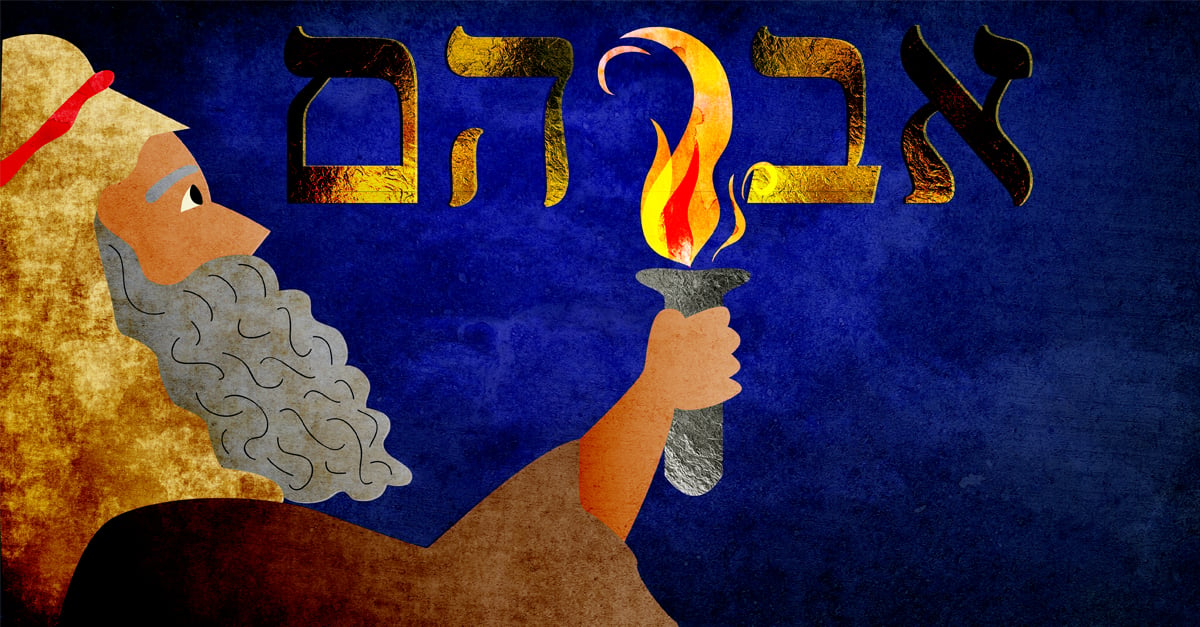 Rabbi David Etengoff ה' יעזור וירחם על אחינו, כל בני ישראל בארץ ישראל ובכל חלקי הארץ The brit bein habetarim (Covenant of the Pieces), wherein the destiny of the Jewish people was revealed to Avraham Avinu, is introduced by this verse: After these incidents, the word of Hashem came to Avram in a vision, saying, “Fear not, Avram; I am your Shield; your reward is exceedingly great,” Sefer Bereishit 15:1, this and all Bible and Rashi translations, The Judaica Press Complete Tanach) This pasuk is unique in that it is the sole encounter between Hashem and Avraham that utilizes the phrase, “in a vision--ba-mahazeh.” Rabbi Don Yitzchak Abarbanel (1437-1508) stresses its singular nature: It is the case that the Torah relates that prophecy was vouchsafed to Avraham on numerous occasions. It never explained, however, on which level of the prophetic experience the prophecy was to be found. For the types of prophecy are of two kinds or varieties: namely, dreams and visions… The terms “mareh” (“visualization”) and “mahazeh” (“vision”) are synonymous. As such, why did the Torah inform us in this particular case that Avraham’s prophecy was specifically a “mahazeh?” After all, this information is irrelevant to the matter at hand. (Commentary on the Torah, Sefer Bereishit 15:1, translation my own) The Abarbanel was not the first interpreter to raise the question as to why the Torah deploys the term “mahazeh.” The Radak (Rabbi David Kimchi, 1160-1235) and the Ramban (Nachmanides, 1194-1270) are two classic commentators who addressed this issue. The Radak suggests that the Torah uses mahazeh in order to differentiate the impending prophetic experience from those that had come before: Mahazeh is used in this instance, even though it was never said regarding any matter about which Hashem spoke to him prior to this moment, since this prophecy was not just verbal in nature. Instead, it contained elements of action, namely, Hashem taking Avraham outside, the counting of the stars and the specific matter of the brit bein habetarim. (Commentary on the Torah, Sefer Bereishit 15:1, translation and brackets my own. In sum, Rav Kimchi opines that the Torah employs the term “mahazeh” in order to prepare us for the new kind of prophecy Avraham Avinu was about to experience, a prophecy of words and action, rather than one comprised solely of verbal communication. In contrast to the Radak, the Ramban suggests that the Torah uses our expression to inform us that Avraham was now able to receive Hashem’s message at a new time: “Now Avraham was able to receive d’var Hashem in a vision during the day, whereas at first, his prophecy [like all of the other prophets except Moshe,] had been limited to visualizations of the night.” (Commentary on the Torah, Sefer Bereishit 15:1, translation and brackets my own) My rebbi and mentor, Rabbi Joseph B. Soloveitchik zatzal (1903-1993), known as “the Rav” by his students and disciples, takes a different approach regarding “mahazeh” than either the Radak or the Ramban. For the Rav, this term signifies a different category of visionary experience than in the past. Prior to this time, Hashem’s prophecies enabled Avraham to experience the Almighty’s warmth, care, and concern. Now, however, “ba-mahazeh,” Avraham is confronted with distance and separation from the Master of the Universe. In part, the Rav derives this concept based on the absence of the term, “va-yomer,” that is found in all of Avraham’s other prophetic encounters, and the presence of the newly introduced term “d’var Hashem:” The introduction, “hayah d’var Hashem el Avram ba-mahazeh, the word of the Lord came to Abram in a vision” (Gen. 15:1), is very interesting… Here the Torah omits the term va-yomer, which it had used repeatedly to describe God’s encounters with Abraham and adds the word ba-mahazeh. Va-yomer means a dialogue, a conversation held face to face. God encountered Abraham and addressed Himself to him. D’var Hashem connotes communication from a distance; the message got to Abraham, but indirectly, God was not present. Ba-mahazeh means perspective, vision. Va-yomer is a higher medium of prophecy than d’var Hashem. Here God was a little distant because the message God delivered to him [in the brit bein habetarim] was one of galut, of exile, oppression, humiliation, and suffering. (Abraham’s Journey: Reflections on the Life of the Founding Patriarch, pages 139-140, underlining and brackets my own) The Rav continues his analysis of, “ba-mahazeh,” and suggests: “Before God spoke to him face to face; now, suddenly it is ba-mahazeh, from a distance. The word reaches him from infinity, from God’s transcendent abode.” In other words, for the first time in Avraham’s adult life, he experienced Hashem’s remoteness rather than His immanence. Little wonder, then, that he desperately needed to hear Him declare, “Fear not, Avram; I am your Shield; your reward is exceedingly great.” Although we are blessed to have Medinat Yisrael, we live in a world in which the message of Hashem is far too often “one of galut, of exile, oppression, humiliation, and suffering.” As such, like Avraham Avinu, we long to hear the reassuring words: “Fear not, Avram; I am your Shield; your reward is exceedingly great.” May the realization of this promise come soon, and in our days. V'chane yihi ratzon. Shabbat Shalom Past drashot may be found at my blog-website: http://reparashathashavuah.org Please contact me at rdbe718@gmail.com to be added to my weekly email list. *** My audio shiurim on the topics of Tefilah and Tanach may be found at: http://tinyurl.com/8hsdpyd *** I have posted 164 of Rabbi Soloveitchik’s English language audio shiurim (MP3 format) spanning the years 1958-1984. Please click on the highlighted link: The Rav ה' יעזור וירחם על אחינו, כל בני ישראל בארץ ישראל ובכל חלקי הארץ 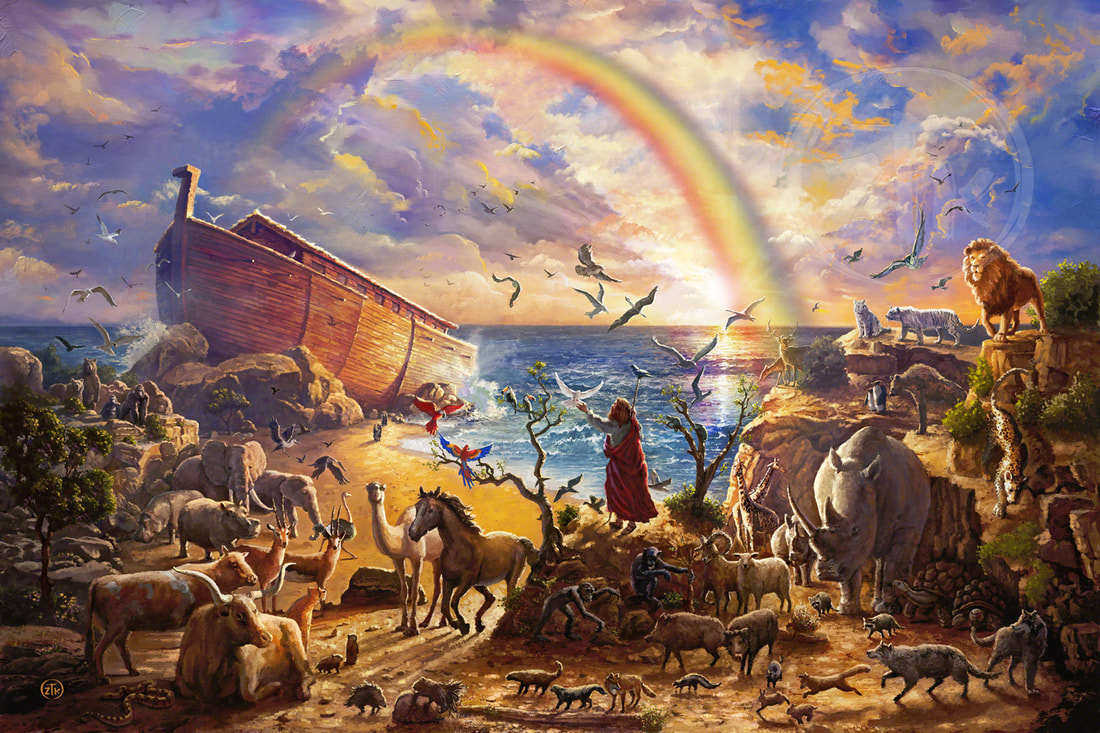 Rabbi David Etengoff The post-Flood world should have been one wherein mankind felt humbled before the Almighty, as their forebears had so recently survived near-universal decimation. As such, they should have demonstrated hakaret hatov (manifest gratitude) to Him for His great chesed. Instead, we are met with this disturbing pasuk regarding the Tower of Babel: “And they said, ‘Come, let us build ourselves a city and a tower with its top in the heavens, and let us make ourselves a name, lest we be scattered [by G-d] upon the face of the entire earth.’” (Sefer Bereishit 11:3-4, this and all Tanach and Rashi translations, The Judaica Press Complete Tanach) At this juncture “Hashem descended to see the city and the tower that the sons of man had built.” (11:5) As Rashi (1040-1105) notes, the expression, “the sons of man had built,” is very peculiar: But the sons of whom else [could they have been]? The sons of donkeys and camels? Rather, [this refers to] the sons of the first man (Adam HaRishon), who was ungrateful and said (Sefer Bereishit 3: 12): “The woman whom You gave [to be] with me [she gave me of the tree; so, I ate”]. These, too, were ungrateful in rebelling against the One Who lavished goodness upon them and saved them from the Flood. In sum, Rashi views the actions of the Dor HaHaphlagah (Generation of the Great Dispersion) as paralleling Adam HaRishon’s behavior when asked by Hashem, “Have you eaten from the tree [of knowledge] of which I commanded you not to eat?” (3:11) Rather than taking personal responsibility for violating the one mitzvah entrusted to him, Adam denied his guilt and blamed G-d for having given him Chava; and Chava, in turn, for giving him the fruit of the Tree of Knowledge. The Ba’al HaTurim (Rav Ya’akov ben Asher, 1270-1340) supports this perspective when he notes that Adam’s reaction personifies the pasuk (verse), “He who repays evil for good—evil will not depart from his house.” (Sefer Mishle 17:13) Unfortunately, Adam, and the Dor HaHaphlagah, repaid Hashem’s beneficence with ingratitude. Years later, the Dor HaMidbar (the Generation of the Desert) sadly repeated this pattern over and over again. As Tosafot in Talmud Bavli, Avodah Zarah 5a state: “Therefore, [Moshe] labeled them [the Jewish people as practitioners of] kafui tovah, since they refused [to give thanks to Hashem for all of His kindness,] that is, they refused to recognize the good that He had done for them in all these matters.” The Torah Temimah (Rabbi Baruch Halevi Epstein, 1860-1942) expands upon Tosafot’s gloss and suggests that kafui tovah is far more than a failure to recognize the good that someone else has performed for you; instead, it is a conscious rejection of the kindness—as if it never had taken place. The Abarbanel’s (1437-1508) analysis of kafui tovah complements Tosafot’s explication: The evilest of all middot is kafui tovah. This is the case, since when a person recognizes [and gives voice] to the benefit he has received from another individual, he adds to the strength of the benefactor to [continue to] provide him with overflowing kindness, with a full sense of desire and in complete goodness. When, however, the recipient of manifest kindness consciously withholds the requisite recognition of the good that is his benefactor’s due, he weakens his supporter’s strength and aspiration to demonstrate further kindness to him. (Commentary on the Torah, Sefer Shemot, chapter 29, this, and the following translations my own) The Abarbanel cites Rav Ammi’s words in Talmud Bavli, Ta’anit 8a in order to reinforce his exposition of our term: “Rain falls only for the sake of Men of Faith (ba’alei emunah) [that is, trustworthy people],” as it is said, “Truth will sprout from the earth, and righteousness will look down from heaven.” (Sefer Tehillim 85:12, Talmud translation, The Soncino Talmud) In the Abarbanel’s estimation, ba’alei emunah are the people who practice hakaret hatov. As such, he reasons that those who engage in kafui tovah are the same people that our Sages identified as individuals steeped in brazenness and temerity (azut panim), and the ones who cause droughts. This idea is intimated in the text, “And the rains were withheld, and there has been no latter rain…you refused to be ashamed.” (Sefer Yirmiyahu 3:3) Little wonder, then, that the Abarbanel maintains: Everything proceeds as our Sages said: “During the times that the Jewish people fulfill the will of the Omnipresent [that is we guard the Torah and verbalize our hakaret hatov], we add to the power, so to speak, of that which is Above. As the text says, ‘Now, please, let the strength of Hashem be increased, as You spoke…’ (Sefer Bamidbar 14:17) [Conversely,] during the times that the Jewish people fail to fulfill the will of the Almighty, we diminish the power, so to speak, of that which is Above. As the text states, ‘You forgot the [Mighty] Rock Who bore you; you forgot the G-d Who delivered you.’” (Sefer Devarim 32:18) According to Rashi, Tosafot, the Abarbanel and the Torah Temimah, kafui tovah is a reprehensible behavioral trait that manifests itself in a brazen repudiation of the good which either Hashem or an individual has done for us. Its remedy, therefore, must be the polar opposite action, hakaret hatov, wherein we demonstrate heartfelt gratitude to our benefactor through words and deeds. With Hashem’s help, may we master this middah and fulfill Shlomo HaMelech’s stirring counsel: “Kindness and truth shall not leave you; bind them upon your neck, inscribe them upon the tablet of your heart; and find favor and good understanding in the sight of G-d and man.” (Sefer Mishle 3:3-4) V’chane yihi ratzon. Shabbat Shalom Past drashot may be found at my blog-website: http://reparashathashavuah.org Please contact me at rdbe718@gmail.com to be added to my weekly email list. *** My audio shiurim on the topics of Tefilah and Tanach may be found at: http://tinyurl.com/8hsdpyd *** I have posted 164 of Rabbi Soloveitchik’s English language audio shiurim (MP3 format) spanning the years 1958-1984. Please click on the highlighted link: The Rav 10/9/2023 Parashat Bereishit, 5784, 2023: "To Be Partners with Hashem in Creating the World"Read Nowה' יעזור וירחם על אחינו, כל בני ישראל בארץ ישראל ובכל חלקי הארץ  Rabbi David Etengoff May Hashem protect our brothers and sisters in Eretz Yisrael, and may He bring a speedy end to this war. V’chane yihi ratzon. Our parasha has always fascinated me. In my view, it contains some of the most thought- provoking and intellectually challenging pasukim in the Torah. One of the most notable examples is the description of humankind’s creation: “And the L-rd G-d formed man of dust from the ground, and He breathed into his nostrils the soul of life (nishmat chayim), and man became a living soul (l’nefesh chaya).” (Sefer Bereishit 2:7, this and the following Bible and Rashi translations, The Judaica Press Complete Tanach) Like the very first verse of the Torah, “In the beginning of G-d’s creation of the heavens and the earth,” our pasuk conceals far more than it reveals. Little wonder, then, that it has captured the attention of our greatest meforshim. Rashi (1040-1105), building upon the translation of Onkelos (35-120 CE), focuses his interpretative efforts on the phrase, “l’nefesh chaya,” and suggests the following analysis: “Cattle and beasts were also called living souls, but this one of man is the most alive of them all, because he was additionally given intelligence and speech.” Somewhat surprisingly, in his monumental work of Torah exegesis entitled “Kli Yakar,” Rabbi Shlomo Ephraim ben Aaron Luntschitz (1550 – 1619) completely rejects Rashi’s gloss. Moreover, in his view, nishmat chayim, rather than l’nefesh chaya, is the crucial phrase to grasp in order to understand humankind’s authentic nature: Nishmat chayim must be understood as the eternal rational soul (hanefesh hamaskelet hanetzachi). Come and learn [after all,] who was the One who breathed [into Adam the soul of life]? We, therefore, find that this [the nishmat chayim] refers to a portion of G-dliness (chalek Elokah) from above. (This and the following translations my own) In sum, Rav Luntschitz shifts the emphasis of the pasuk from l’nefesh chaya to nishmat chayim, defines the latter term in an unprecedented manner, and declares it to be a chalek Elokah. Beyond a doubt, this is a theological tour de force. Rav Luntschitz continues his exposition of our verse and notes that Hashem’s overwhelming kindness in providing every person with a nishmat chayim is necessary but insufficient for the achievement of the highest level of humanity. Instead, we must respond in kind, and tirelessly expend our energies in order to reach the heights of that which makes us truly human: This is to say, that although Hashem breathed the eternal rational soul into Adam, nonetheless, man, at the outset of his being, is indistinguishable from any other living soul (nefesh chaya) and is just like the other animals. [As the text states:] “For man is born as a wild donkey.” (Sefer Iyov 11:12) [Moreover,] the essence of man’s perfection (shlaimuto) is contingent upon the diligence of his labors and the degree of good inherent in his choices as he opens his [potentially] intellectually maturing eyes (einei sichlo) while growing in age. At this juncture, Rav Luntschitz clarifies the crux of his presentation: Regarding the beginning of a person’s life – although Hashem has already breathed into an individual the soul of the breath of life (nishmat ruach chayim), this soul will nonetheless never be actualized and will remain solely in potential, unless he will try with depth-level efforts to go to the “head of the troops,” and fight the war of Hashem. If he fails to do so, he will remain in his original animalistic state (that is, ruled by the yetzer harah) and will be the equivalent of an animal…The text reveals this matter to us [through the use of the phrase, “nishmat chayim,”] in order to teach us the [vital] lesson that man should never beguile himself into thinking (lit. “saying”) that he can achieve perfection (shlaimuto) without tremendous effort and persevering exertion…rather, everything depends upon his own actions… In my estimation, Rav Luntschitz’s explication of nishmat chayim is reminiscent of Rabbi Akiva’s famous response to the evil Roman governor, Turnus Rufus, when asked: “If [your] G-d is desirous that man should have a brit milah (ritual circumcision), why does the newborn not exit his mother’s womb in this state?” Rabbi Akiva’s response informs our understanding of the mitzvot until our present moment: “Because the Holy One blessed be He did not give the mitzvot to the Jewish people except to [spiritually] purify them through their performance.” (Midrash Tanchuma, Parashat Tazria V, translation my own) Rabbi Akiva is teaching us a fundamental lesson concerning our relationship with the Almighty: A newborn male baby is born in a state of physical imperfection; the mitzvah of brit milah removes this deficiency, and sets him on a lifelong path toward spiritual perfection. Therefore, through the fulfillment of this commandment, we join our Creator and become His partner in Creation (shutaf im HaKadosh Baruch Hu b’ma’aseh Bereishit). I believe that Rav Luntschitz is teaching us a parallel lesson on the moral–ethical plane of human existence: Just as we perfect the physical body that Hashem has bestowed upon us through the mitzvah of brit milah, and thereby serve as shutfim im HaKadosh Baruch Hu b’ma’aseh Bereishit, so, too, must we consistently actualize the nishmat chayim that He has given us, in order to be His partners in Creation and ultimately become all that we can be. As the Ibn Ezra (1089-1167) taught us so long ago in a celebrated liturgical poem (piyyut), “My soul thirsts for G-d, for the living G-d, my heart (mind) and my body run to the living G-d.” (Translation my own) With Hashem’s help and our fervent desire, may we ever seek to become His shutfim b’ma’aseh Bereishit. V’chane yihi ratzon. Shabbat Shalom Past drashot may be found at my blog-website: http://reparashathashavuah.org. Please contact me at rdbe718@gmail.com to be added to my weekly email list. *** My audio shiurim on the topics of Tefilah and Tanach may be found at: http://tinyurl.com/8hsdpyd *** I have posted 164 of Rabbi Soloveitchik’s English language audio shiurim (MP3 format) spanning the years 1958-1984. Please click on the highlighted link: The Rav 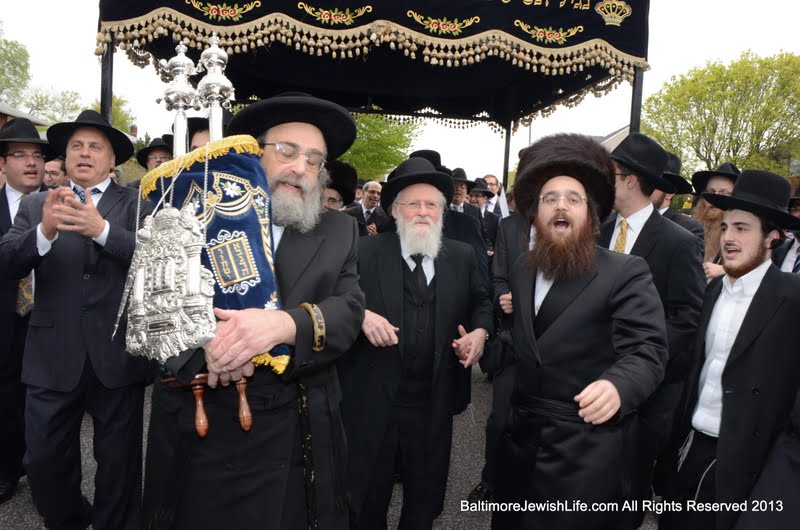 Rabbi David Etengoff Dedicated to the sacred memories of my mother, Miriam Tovah bat Aharon HaKohane, father-in-law, Levi ben Yitzhak, sister, Shulamit bat Menachem, sister-in-law, Ruchama Rivka Sondra bat Yechiel, Chana bat Shmuel, Yehonatan Binyamin ben Mordechai Meir Halevi, Tikvah bat Rivka Perel, Gittel Malka bat Moshe, Alexander Leib ben Benyamin Yosef, the Kedoshim of Har Nof, Pittsburgh, and Jersey City, the refuah shlaimah of Mordechai HaLevi ben Miriam Tovah, and the health and safety of our brothers and sisters in Israel and around the world. We know that the transformation of the second day of Shemini Atzeret into Simchat Torah originated in Babylon. Yet, exactly when this change took place remains lost in the sands of time. As Rabbi Ari Enkin, quoting Rabbi Avraham Yaari’s widely respected work, Toldot Chag Simchat Torah (The History of the Festival of Simchat Torah), notes: The evolution of Simchat Torah as part of the Shemini Atzeret celebrations first originated in Babylon and was not even observed in Israel until the end of the Gaonic period [11th century]. For Babylonian Jewry, Simchat Torah was the celebration of the completion of the annual Torah reading cycle. The Torah had been divided up into 54 separate parshiot, with a different parasha (and sometimes two at a time) being read every Shabbat, thereby completing the entire Torah each year. (http://hirhurim.blogspot.com/2008/10/simchat-torah.html, brackets my own) Significantly, however, the name “Simchat Torah” does not appear in the Babylonian Talmud. This is particularly of note since this work contains material up to and including the Sixth century CE. Therefore, we can readily surmise that Simchat Torah is, in all likelihood, a product of the post-Talmudic period. Rav Amnon Bazak, a noted Rosh Yeshiva at Yeshivat Har Etzion, suggests that the transformation of the second day of Shemini Atzeret into the holiday of Simchat Torah by Babylonian Jewry was part of the overall conceptual transference of the chagim from agriculturally focused to essentially Halakha-based days of celebration: As opposed to the “Biblical Jew,” for whom agriculture stood at the center of existence, the “post-Temple Jew” concentrates his religious life in the proverbial “four cubits of Halakha.” Therefore, the agricultural calendar was replaced by the “Torah calendar.” In this system, the festival of the first harvest (Shavuot), which commemorated the first opportunity to benefit from one’s produce, was transformed into the holiday of Matan Torah [the Giving of the Torah], the first step in the nation’s acceptance of the Torah. Shemini Atzeret, which, for the agrarian society, was celebrated as the end of the year, evolved into the celebration of the completion of the Torah reading, Simchat Torah. (http://vbm-torah.org/sukkot/shmin-bazak.htm, brackets my own) At this juncture, it is clear that the Chachamim of Babylonia Jewry changed the nature of the second day of Shemini Atzeret into a day with its own unique identity and purpose—a day wherein the annual completion of the reading of the Torah was celebrated. Why, however, did Chazal create Simchat Torah? I believe this passage from the Siddur helps answer our question: Therefore, we are obligated to thank You, praise You, glorify You, bless, sanctify, and offer praise and thanks to Your Name. We are fortunate (ashreinu)—how good is our portion, how pleasant our lot, and how beautiful our inheritance! (Translation, The Complete ArtScroll Siddur, page 27, with my emendations for clarity and parentheses my own) The first mention of this citation is found in the Gaonic work, Siddur Rav Amram Gaon. We must recognize that Rav Amram did not compose this section. Rather, the overall purpose of his work was to report, and thereby effectively formalize, the liturgical practices prevalent in the Babylonia of his day. As such, the origin of this section predated Rav Amram’s classic work by an indeterminate number of years. In my estimation, Simchat Torah’s underlying rationale is found in the words, “We are fortunate (ashreinu)—how good is our portion, how pleasant our lot, and how beautiful our inheritance”—one of the most popular phrases we sing and dance to during the course of the Hakafot. Ashreinu follows the introductory statement, “we are obligated to thank You, praise You, glorify You, bless, sanctify, and offer praise and thanks to Your Name.” This phrase is, perhaps, one of the preeminent formulations of hakaret hatov in our liturgy. No wonder we are so fortunate! No wonder we give such effusive thanks! Our inheritance (yerushatainu) is the Torah itself, the words of the Creator of the Universe! “Moshe commanded us the Torah, it is the inheritance of the entire congregation of Ya’akov.” (Sefer Devarim 33:4). We can now understand why Simchat Torah was created: Chazal designated this time as a celebration of the Torah, in order to give voice to our innermost feelings of hakaret hatov to the Almighty for giving us this gift. In a word, on Simchat Torah we strive to emulate David HaMelech when he danced with passionate abandon while bringing the Aron Kodesh to Yerushalayim. (Sefer Shmuel II: 6:5). As such, it is the perfect day to fulfill his inspirational words: “Serve Hashem with simcha come before Him with praise.” (Sefer Tehillim 100:2, translation, The Judaica Press Complete Tanach) May this Simchat Torah be a special time when we strengthen our connection to Hashem and demonstrate heartfelt hakaret hatov, joy, praise, and love of Him as never before. V’chane yihi ratzon. Shabbat Shalom and Chag Sameach! Past drashot may be found at my blog-website: http://reparashathashavuah.org. Please contact me at rdbe718@gmail.com to be added to my weekly email list. *** My audio shiurim on the topics of Tefilah and Tanach may be found at: http://tinyurl.com/8hsdpyd *** I have posted 164 of Rabbi Soloveitchik’s English language audio shiurim (MP3 format) spanning the years 1958-1984. Please click on the highlighted link: The Rav 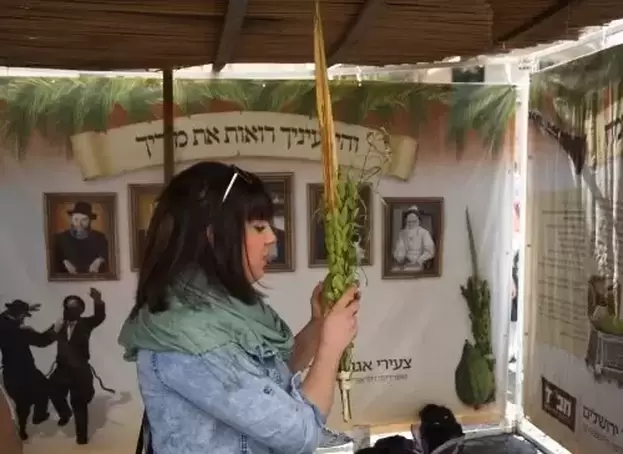 Rabbi David Etengoff Dedicated to the sacred memories of my mother, Miriam Tovah bat Aharon HaKohane, father-in-law, Levi ben Yitzhak, sister, Shulamit bat Menachem, sister-in-law, Ruchama Rivka Sondra bat Yechiel, Chana bat Shmuel, Yehonatan Binyamin ben Mordechai Meir Halevi, Tikvah bat Rivka Perel, Gittel Malka bat Moshe, Alexander Leib ben Benyamin Yosef, the Kedoshim of Har Nof, Pittsburgh, and Jersey City, the refuah shlaimah of Mordechai HaLevi ben Miriam Tovah, and the health and safety of our brothers and sisters in Israel and around the world. The Festival of Succot contains two major mitzvot, dwelling in the Succah on the night of the 15th of Tishrei, and the taking of the Arba’at HaMinim (the Four Species). These acts are in the halachic category of mitzvot aseh sh’hazman grama (time-bound Positive Commandments). Consequently, while women may fulfill these commandments, they are not obligated to do so. This principle is based on the well-known statement of Chazal: “And in all cases of time-bound Positive Commandments, men are obligated, and women are exempt.” (Mishna Kiddushin 1:7) The following midrashic interpretation of the Arba’at HaMinim is particularly intriguing in light of this ruling: “The fruit of a beautiful tree [etrog],” this refers to Sarah, since the Holy One blessed be He honored her (sh’hidrah, literally, beautified her) with good health in her old age. As the text states: “Now Abraham and Sarah were old, coming on in years…” (Sefer Bereishit 18:11) “Date palm fronds [lulav],” this refers to Rivka, for just like a date palm tree has both fruit and thorns, so, too, did Rivka give birth to a tzadik (Ya’akov) and a ra’asha (Eisav). “A branch of a braided tree [hadas],” this refers to Leah, for just like the hadas is filled with leaves, so, too, was Leah [blessed] with many children. “Willows of the brook [arvei nachal],” this refers to Rachel, for just like the arvei nachal wither before the other Arba’at HaMinim, so, too, did Rachel die before her sister [Leah]. (Midrash Vayikra Rabbah, Parashat Emor 30:10, translation and brackets my own) We are immediately struck by the midrash’s choice of the Emahot as metaphorically representing the Arba’at HaMinim. After all, what is their connection since, as we have seen, women are exempt from mitzvot aseh sh’hazman grama? In my view, the midrash followed this approach in order to teach us a crucial lesson: Judaism is comprised of two beautiful and equally vital Massorot (traditions), the Massorah of the Fathers and the Massorah of the Mothers. Therefore, it is fitting and proper to compare the Emahot to the Arba’at HaMinim. In modern times, there was no greater exponent of this approach than my rebbe and mentor, Rabbi Joseph B. Soloveitchik zatzal (1903-1993), known as “the Rav” by his students and followers: People are mistaken in thinking that there is only one Massorah and one Massorah community; the community of the fathers. It is not true. We have two massorot, two traditions, two communities, two shalshalot ha-kabbalah [chains of Tradition]—the massorah community of the fathers and that of the mothers…What kind of a Torah does the mother pass on? I admit that I am not able to define precisely the masoretic role of the Jewish mother. Only by circumscription I hope to be able to explain it. Permit me to draw upon my own experiences. At this point we are privy to the Rav’s deepest personal reminiscences of his beloved mother: I used to have long conversations with my mother. In fact, it was a monologue rather than a dialogue. She talked and I “happened” to overhear. What did she talk about? I must use an halakhic term in order to answer this question: she talked me-inyana de-yoma [about the halakhic aspects of a particular holy day]. I used to watch her arranging the house in honor of a holiday. I used to see her recite prayers; I used to watch her recite the sidra [Torah portion] every Friday night and I still remember the nostalgic tune. I learned from her very much. What was the essence of that which the Rav learned from his mother? What gift did she give him that transformed his perception of the world? As he states in his inimitable manner: Most of all I learned that Judaism expresses itself not only in formal compliance with the law but also in a living experience. She taught me that there is a flavor, a scent and warmth to mitzvot. I learned from her the most important thing in life—to feel the presence of the Almighty and the gentle pressure of His hand resting upon my frail shoulders. Without her teachings, which quite often were transmitted to me in silence, I would have grown up a soulless being, dry and insensitive. (Rabbi Joseph B. Soloveitchik, “A Tribute to the Rebbitzen of Talne,” Tradition: A Journal of Orthodox Jewish Thought, 1978, Vol. 17, number 2, pages 76-77) It is, and perhaps always has been, the unique privilege of Jewish women to enable our people to “… feel the presence of the Almighty and the gentle pressure of His hand resting upon [our] frail shoulders.” Therefore, when we rejoice with the Arba’at HaMinim this Succot, let us remember the Midrash’s essential and powerful message to embrace both the Massorah of the Mothers and the Massorah of the Fathers, so that we may fulfill this mitzvah as a “living experience” in all its “flavor, scent and warmth.” With Hashem’s help, may we be zocheh (merit) to do so. V’chane yihi ratzon. Shabbat Shalom and Chag Sameach! Past drashot may be found at my blog-website: http://reparashathashavuah.org Please contact me at rdbe718@gmail.com to be added to my weekly email list. *** My audio shiurim on the topics of Tefilah and Tanach may be found at: http://tinyurl.com/8hsdpyd *** I have posted 164 of Rabbi Soloveitchik’s English language audio shiurim (MP3 format) spanning the years 1958-1984. Please click on the highlighted link: The Rav |
Details
Archives
April 2024
AuthorTalmid of Rabbi Soloveitchik zatzal Categories |
- Blog: Rabbi David Etengoff: Parashat HaShavuah
- Sefer Bereishit 5784&5785
- Sefer Shemot 5784&5785
- Sefer Vayikra 5784&5785
- Sefer Bereishit 5782&5783
- Sefer Shemot 5782&5783
- Sefer Vayikra 5782&5783
- Sefer Bamidbar 5782&5783
- Sefer Devarim 5782&5783
- Sefer Bereishit 5780& 5781
- Sefer Shemot 5780&5781
- Sefer Vayikra 5780&5781
- Sefer Bamidbar 578&5781
- Sefer Devarim 578&5781
- Sefer Bereishit 5778&5779
- Sefer Shemot 5778&5779
- Sefer Vayikra 5778&5779
- Sefer Bamidbar 5778&5779
- Sefer Devarim 5778&5779
- Sefer Bereishit 5776&5777
- Sefer Bereishit 5774&5775
- Sefer Bereishit 5772&5773
- Sefer Bereishit 5771&5770
- Sefer Shemot 5776&5777
- Sefer Shemot 5774&5775
- Sefer Shemot 5772&5773
- Sefer Shemot 5771&5770
- Sefer Vayikra 5776&5777
- Sefer Vayikra 5774&5775
- Sefer Vayikra 5772&5773
- Sefer Vayikra 5771&5770
- Sefer Bamidbar 5776&5777
- Sefer Bamidbar 5774&5775
- Sefer Bamidbar 5772&5773
- Sefer Bamidbar 5771&5770
- Sefer Devarim 5776&5777
- Sefer Devarim 5774&5775
- Sefer Devarim 5772&5773
- Sefer Devarim 5771&5770
 RSS Feed
RSS Feed
